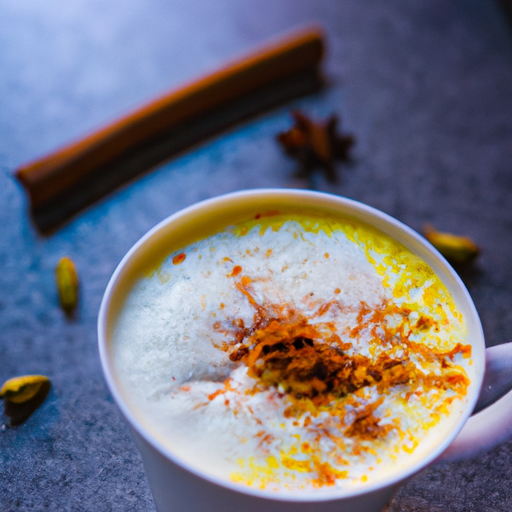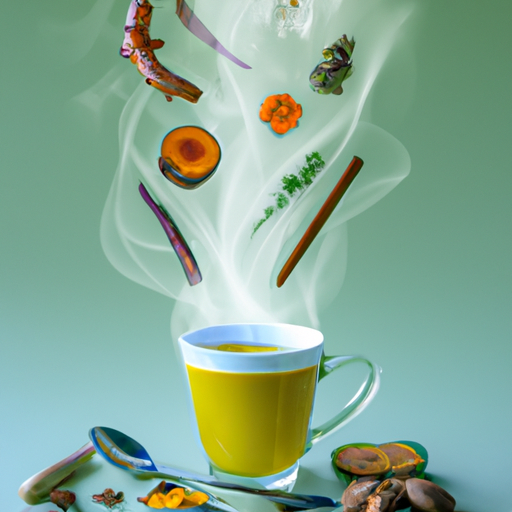As someone who deals with acid reflux, I understand the discomfort it brings. It can really mess up your day, make eating tricky, and even mess with your sleep. If you struggle with this condition, rest assured you’re not alone!
But did you know that drinking tea can actually help alleviate symptoms of acid reflux?
As the saying goes, ‘An ounce of prevention is worth a pound of cure.’And when it comes to acid reflux, prevention can come in the form of a warm, soothing cup of tea.
In this article, we’ll explore which teas are best for acid reflux and why they work.
So brew yourself a cup and let’s dive in!
Key Takeaways
- Chamomile tea can effectively reduce inflammation and irritation in the esophagus, making it a good choice for managing acid reflux symptoms.
- Ginger tea’s anti-inflammatory compounds can protect against cellular damage and relieve nausea and vomiting, making it another beneficial option for acid reflux sufferers.
- Peppermint tea and ginger tea’s natural anti-spasmodic properties can help relax the muscles in the digestive tract, providing relief for acid reflux symptoms.
- Green tea’s catechins can promote the growth of good bacteria in the gut and reduce inflammation in the digestive tract, but it’s important to use water that is just below boiling point to avoid destroying the delicate polyphenols in it.
Understanding Acid Reflux
You’ll want to understand acid reflux before figuring out which tea will be good for alleviating your symptoms. Acid reflux is a common condition that occurs when stomach acid flows back up into the esophagus, causing discomfort and sometimes a burning sensation.
Symptoms of acid reflux can include heartburn, regurgitation, and difficulty swallowing. There are many potential causes of acid reflux, including obesity, smoking, pregnancy, and certain medications. However, lifestyle factors such as diet and eating habits can also play a significant role.
Making changes such as avoiding trigger foods, eating smaller meals, and avoiding lying down immediately after eating can help manage acid reflux symptoms. It’s important to work with a healthcare provider to determine the underlying cause of your acid reflux and develop an individualized treatment plan.
Drinking tea can be a helpful addition to a comprehensive acid reflux management plan.
Benefits of Drinking Tea for Acid Reflux
If you’re looking for a natural way to soothe your stomach discomfort after a spicy meal, sipping on a warm cup of tea might just do the trick.
But not all teas are created equal when it comes to alleviating acid reflux symptoms. Certain types of tea, like green tea, ginger tea, and chamomile tea, have been shown to provide relief for heartburn and acid reflux.
To prepare tea for acid reflux relief, it’s important to use the proper method. Boiling water can actually cause tea to become more acidic, so it’s recommended to use water that is just below boiling point. Additionally, adding a bit of honey or lemon can help to further soothe the digestive system.
But of all the teas that have been studied for their acid reflux benefits, chamomile tea may be the most effective.
In the next section, we’ll explore how chamomile tea can help to calm acid reflux symptoms.
Chamomile Tea
Chamomile tea has been extensively studied and found to effectively alleviate digestive discomfort caused by excessive stomach acid. This popular herbal tea is made from the dried flowers of the chamomile plant, which contains compounds that have anti-inflammatory and antispasmodic properties.
Here are some benefits of drinking chamomile tea for acid reflux:
- Chamomile tea can reduce inflammation and irritation in the esophagus, which can help soothe heartburn and other acid reflux symptoms.
- This tea has a calming effect on the body and mind, which can help reduce stress and anxiety that can exacerbate acid reflux.
- Chamomile tea is easy to make and can be enjoyed hot or cold depending on your preference.
- Some popular brands of chamomile tea to try include Traditional Medicinals, Yogi Tea, and Bigelow.
Compared to other herbal teas, chamomile tea has been shown to be particularly effective at reducing acid reflux symptoms. However, if you’re not a fan of chamomile, ginger tea is another great option to try.
Ginger Tea
I love drinking ginger tea because of its anti-inflammatory and antioxidant properties. It helps me manage my acid reflux symptoms. Ginger contains compounds that reduce inflammation and protect against cellular damage caused by free radicals.
Additionally, ginger tea is known to improve digestion by stimulating the production of digestive juices and reducing bloating and gas. Overall, incorporating ginger tea into my daily routine has been a game-changer for my acid reflux management.
Anti-inflammatory and Antioxidant Properties
You’ll be happy to know that certain teas, including green tea and ginger tea, have powerful anti-inflammatory and antioxidant properties that can help soothe acid reflux symptoms. Green tea, in particular, contains a type of antioxidant called catechins, which have been shown to reduce inflammation in the digestive tract. This can be especially beneficial for individuals with acid reflux, as inflammation is a common trigger for symptoms such as heartburn and indigestion.
Another tea with potent anti-inflammatory properties is chamomile tea. In addition to its potential benefits for acid reflux, chamomile tea is also commonly used in skincare due to its anti-inflammatory and antimicrobial properties. However, it’s important to note that chamomile tea may have potential side effects, such as allergic reactions or interactions with certain medications. As with any herbal remedy, it’s always best to consult with a healthcare provider before incorporating it into your routine. With these powerful anti-inflammatory and antioxidant properties, it’s no wonder why certain teas can be helpful for managing acid reflux symptoms. And, as we’ll discuss in the next section, some teas can even improve digestion.
Improves Digestion
Feeling bloated and uncomfortable after meals? Sipping on certain teas can help improve digestion, making you feel lighter and more energized throughout the day.
Here are four ways tea can help with digestion:
-
Tea and bloating: Certain teas, like peppermint tea and ginger tea, have natural anti-spasmodic properties that can help relax the muscles in your digestive tract, reducing bloating and cramping.
-
Tea and constipation: Drinking herbal teas like senna tea or dandelion tea can help stimulate bowel movements and relieve constipation.
-
Tea and gut health: Tea, especially green tea, contains polyphenols that promote the growth of good bacteria in your gut, which aids in digestion and overall gut health.
-
Tea and hydration: Staying hydrated is essential for healthy digestion, and drinking tea can help you meet your daily fluid needs while also providing additional health benefits.
Now, let’s move on to the next step and talk about licorice root tea, which has been found to be particularly helpful for acid reflux symptoms.
Licorice Root Tea
Enjoy the soothing effects of licorice root tea, known to help relieve symptoms of acid reflux. Licorice root tea is a popular herbal remedy that has been used for centuries to treat various health conditions. This tea is made from the root of the licorice plant and is believed to have many health benefits, including improving digestion and reducing inflammation.
One of the main benefits of licorice root tea is its ability to improve digestion. This tea contains compounds that help to increase the production of digestive enzymes, which can help to break down food more efficiently. Additionally, licorice root tea can help to soothe the lining of the stomach and reduce inflammation, which can be especially helpful for individuals with acid reflux.
To brew licorice root tea, simply steep a teaspoon of dried licorice root in a cup of hot water for 5-10 minutes.
Moving on to the next tea, fennel tea is another great option for individuals with acid reflux. This tea is made from the seeds of the fennel plant and is known for its ability to soothe the digestive system.
Fennel Tea
If you’re looking for a natural way to soothe your stomach, try adding fennel tea to your diet. Fennel tea is made from the seeds of the fennel plant, which have been used for centuries to aid digestion.
Fennel tea has a licorice-like flavor and is often consumed after meals to help with bloating, gas, and acid reflux. Fennel tea recipes are easy to find online and can be made by steeping fennel seeds in hot water for several minutes.
Fennel tea has many health benefits, including its ability to reduce inflammation, improve digestion, and alleviate symptoms of acid reflux. Additionally, fennel tea is a good source of vitamins and minerals, including vitamin C, potassium, and magnesium.
Peppermint tea is another tea that is known to help with acid reflux symptoms. Its cooling and soothing properties can help to reduce inflammation and calm the stomach. So, if you’re looking for a natural way to relieve acid reflux symptoms, try incorporating fennel tea and peppermint tea into your diet.
Peppermint Tea
I’ve found that peppermint tea is a great option for soothing an upset stomach. This tea has been shown to relieve symptoms of nausea and vomiting, making it a great choice for those experiencing digestive discomfort.
Additionally, peppermint tea can help to relax the muscles in the digestive tract, providing relief from cramps and other uncomfortable sensations. Overall, I highly recommend giving peppermint tea a try if you’re looking for a natural way to soothe your digestive system.
Relieves Nausea and Vomiting
Relieving nausea and vomiting, ginger tea can be a great option for those with acid reflux. Ginger has been used for centuries as a natural remedy for digestive issues, and drinking ginger tea can be a helpful addition to your diet. Here are some benefits of ginger tea for those experiencing nausea and vomiting:
- Ginger can reduce inflammation in the digestive system, which can help alleviate nausea and vomiting.
- Ginger contains compounds that can soothe the stomach and promote digestion.
- Drinking ginger tea can also help you stay hydrated, which is important when experiencing nausea and vomiting.
- Unlike some medications, ginger tea has no known side effects, making it a safe and natural option for those with acid reflux.
In addition to relieving nausea and vomiting, ginger tea can also soothe the digestive tract. This can be especially helpful for those with acid reflux, as the condition can cause discomfort and irritation in the esophagus and stomach.
To learn more about how ginger tea can benefit your digestive health, continue reading about the next subtopic.
Soothes Digestive Tract
Soothing the digestive tract, ginger can be a great addition to your diet for those experiencing discomfort and irritation in the esophagus and stomach. This popular spice has been used for centuries as a natural remedy for various digestive issues, including acid reflux. Ginger contains compounds that help to neutralize stomach acid and reduce inflammation, making it an effective herbal remedy for acid reflux.
Aside from ginger, there are other herbal remedies that can aid in natural healing of acid reflux. Chamomile tea, for instance, has been found to have anti-inflammatory properties that can soothe the lining of the esophagus and reduce discomfort caused by acid reflux. Additionally, licorice root has been shown to have protective effects on the digestive tract, helping to prevent damage from stomach acid.
By incorporating these natural remedies into your diet, you can alleviate symptoms of acid reflux and promote overall digestive health.
Green tea is another beverage that has been found to have positive effects on acid reflux. Its antioxidant properties have been shown to protect the lining of the esophagus and reduce inflammation, making it an ideal addition to any diet aimed at reducing acid reflux symptoms. Whether consumed hot or iced, green tea can be a soothing and beneficial beverage for those experiencing acid reflux.
Green Tea
You’ll be pleased to know that green tea can help alleviate acid reflux symptoms. Green tea has many health benefits, and one of them is its ability to soothe the digestive tract. This is due to the presence of polyphenols, which have anti-inflammatory properties that can help reduce inflammation in the esophagus and stomach.
To get the most out of green tea, it’s important to use the right brewing techniques. Boiling water can destroy the delicate polyphenols in green tea, so it’s best to use water that’s just below boiling point. Steep the tea for no longer than two minutes to avoid a bitter taste.
By incorporating green tea into your diet, you can enjoy its many benefits, including relief from acid reflux symptoms.
Moving on to the next section, rooibos tea is another great option for those looking to alleviate acid reflux symptoms.
Rooibos Tea
Rooibos tea is a miracle worker when it comes to calming down an upset stomach, making you feel like you can conquer the world. This South African herbal tea is caffeine-free and has a unique nutty, sweet flavor that makes it a perfect alternative to regular tea.
Rooibos tea is also a great choice for those with acid reflux because it is low in tannins, which can irritate the stomach lining. In addition to its soothing effect on the stomach, it has numerous health benefits. It’s rich in antioxidants, which help to protect the body against damage from free radicals. It also contains minerals such as calcium, magnesium, and potassium, which are essential for maintaining strong bones and a healthy heart.
To brew Rooibos tea, simply steep a tea bag or loose leaves in boiling water for 5-7 minutes. Add honey or lemon for a touch of sweetness, if desired. So, next time you’re looking for a healthy and tasty beverage to help soothe your acid reflux, reach for a cup of Rooibos tea!
Frequently Asked Questions
Can drinking tea worsen acid reflux symptoms?
I find that drinking certain teas can worsen my acid reflux symptoms. Tea can be acidic and cause heartburn or worsen GERD. It’s important to avoid teas with high levels of caffeine or those that are highly acidic.
How much tea should be consumed to alleviate acid reflux symptoms?
I find that drinking tea in moderation helps alleviate my acid reflux symptoms. I limit my consumption to one or two cups a day and use brewing methods that reduce acidity, such as adding milk or using herbal teas.
Can adding milk or sugar to tea affect its ability to help with acid reflux?
Adding additives like milk or sugar to tea may worsen acid reflux symptoms. Certain tea varieties, such as ginger, chamomile, and licorice root, have been shown to alleviate symptoms. Consult a healthcare provider for personalized recommendations.
Are there any teas that should be avoided for acid reflux?
I researched the best tea blends for acid reflux relief and found that ginger tea and chamomile tea are effective. Teas to avoid for acid reflux include peppermint, spearmint, and black tea due to their high acidity levels.
Can tea be used as a long-term solution for acid reflux or is it only a temporary relief?
As someone who suffers from acid reflux, I’ve found that while tea can provide temporary relief, it’s not a long-term solution. To manage symptoms, I’ve explored alternative remedies and lifestyle changes, such as avoiding trigger foods and practicing stress reduction techniques.
Conclusion
In conclusion, finding relief from acid reflux can be as simple as sipping on a hot cup of tea. Chamomile, ginger, licorice root, fennel, peppermint, green, and rooibos tea are all excellent choices for soothing the discomfort associated with acid reflux. Each tea has its own unique benefits, from reducing inflammation to improving digestion.
Drinking tea for acid reflux is like having a cozy blanket wrapped around you on a chilly winter day. It provides comfort and relief, allowing you to relax and enjoy your day without the distraction of uncomfortable symptoms. So, next time you feel the burn of acid reflux, consider reaching for a cup of tea and let its healing properties work their magic.










